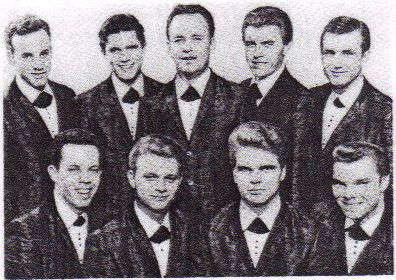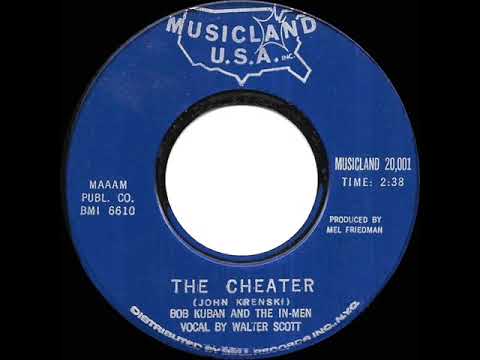BOB KUBAN & THE IN-MEN

Bob Kuban & The In-Men were a blue-eyed soul act best known for 1966’s “The Cheater,” and for the 1983 murder of their lead singer.
Robert Kuban was born in St. Louis, Missouri, on August 19, 1940. He graduated from the St. Louis Institute of Music and became a high school teacher. He also played drums on the weekends and at wedding gigs. In 1963, he met Walter Scott (real name: Notheis), who sang lead with a band called the Pacemakers. Kuban recruited “Wally” to sing lead with a band he was putting together. The other members included trumpeter Pat Hixon, keyboardist Greg Hoeltzel, bassist Mike Krenski, guitarist Ray Schulte, saxophonist Harry Simon, and trombonist Skip Weisser. The Bob Kuban Band quickly got signed to Norman Weinstoer’s Norman label. “Jerkin’ Time” became a local hit in St. Louis in August of 1965.
An acquaintance of Weinstoer, Mel Freedman, heard the band’s song “The Cheater,” and thought it had potential. Freedman had contacts at Bell-Amy Records in New York, and assured the band they would get national distribution if they went with him and his Musicland label. They agreed, and “The Cheater” came out on Musicland U.S.A. under their new name, Bob Kuban & The In-Men. With Bell-Amy’s distribution network behind it, “The Cheater” climbed to #12 on the Billboard Hot 100 chart in March 1966.
After the release of two low-charting follow-up singles and an album, Walter Scott, Greg Hoeltzel, Mike Krenski, and Ray Schulte spun off to record as The Guise. Kuban hired new band members and made two more singles for Musicland, “Harlem Shuffle” and “The Batman Theme.” In 1970, one last In-Men release appeared on Reprise. In 1975, the Bob Kuban Brass recorded an album for Norman Records, Get Ready for Some Rock & Soul.
Of the original In-Men, Kuban remained in music while Hoeltzel became a dentist, Hixon went into computer programming, Weisser worked as a bartender in Las Vegas, and Krenski became employed at McDonald Aircraft. Meanwhile, Walter Scott became a tragic victim of life imitating art when the lyrics to “The Cheater” presaged his fate.
In 1983, Kuban and Scott talked about putting together a new group of In-Men. Per Kuban, Scott was excited about the idea as the band’s 20th anniversary was coming up in 1984: “He left his home in his jogging suit and running shoes to get a battery for his car, and nobody ever saw him again; he just vanished, two days after Christmas. Three-and-a-half years later, in April of ‘87, they found his body stuffed in a cistern.”
Scott had been tied up and shot in the chest. His second wife, JoAnn, pleaded guilty to hindering the prosecution of his murder and received a five-year sentence, of which she served eighteen months. Her lover, James H. Williams Sr, whom she married in 1986, was found guilty of two counts of capital murder involving the deaths of both his previous wife, Sharon, and Walter Scott. (The death of Mrs. Williams was originally thought to have been the result of a car accident.) Williams’ son, who was incarcerated and did not get along with his father, told police where to find Scott’s body. James Williams received a life sentence and died in prison in 2011.
Rock critic Dave Marsh included “The Cheater” in his 1989 book, The Heart of Rock and Soul: The 1001 Greatest Singles Ever Made.
Bob Kuban, 84, died on January 20, 2025.
Charted singles:
“The Cheater” (1966) Pop #12
“The Teaser” (1966) Pop #70
“Drive My Car” (1966) Pop #93

